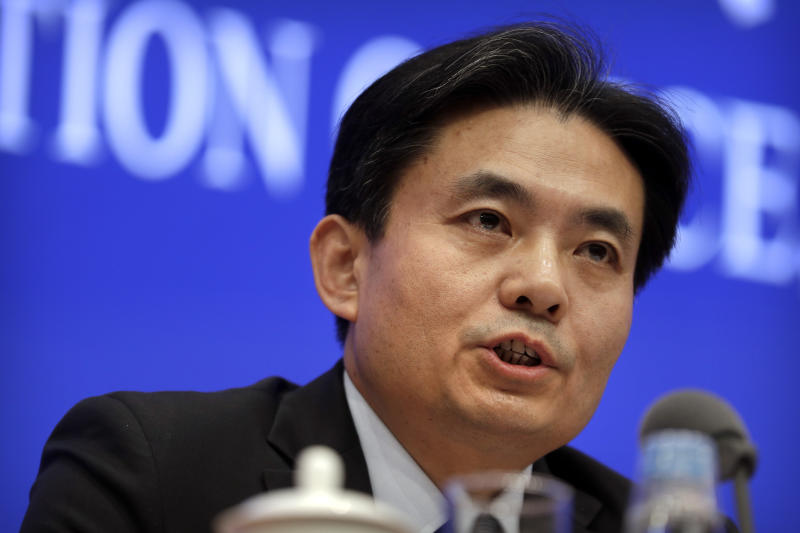HK protests threatening 'one country, two systems', destabilising city and mainland: Beijing
Sign up now: Get insights on Asia's fast-moving developments

Hong Kong Macao Affairs Office spokesman Yang Guang said those who harboured ideas of universal suffrage "would get nowhere".
PHOTO: AP
BEIJING - Beijing has warned that protests in Hong Kong are reaching a critical point and threatening the bottom line of "one country, two systems".
It has also charged that the protesters have become "foot soldiers" of foreign forces bent on destabilising both the city and the mainland.
Both are clear signs that Beijing is treating the demonstrations as a threat to national sovereignty.
The State Council's Hong Kong Macao Affairs Office (HKMAO) highlighted on Tuesday (Sept 3) the threat to the policy which grants the city a high degree of autonomy, while remaining a part of China.
HKMAO spokesman Yang Guang said radical protesters had made clear their purpose to "make Hong Kong chaotic, paralyse its government, take over the jurisdiction of the Special Administration Region and turn Hong Kong into an independent or semi-independent political entity".
"They want to achieve full autonomy, to confront the central government and eventually make 'one country, two systems' cease to function except in name," said Mr Yang, calling on the Hong Kong government and city residents to safeguard this bottom line.
Fellow spokesman Xu Luying said at the same press briefing that the city was facing the "most grim" situation since its return to China, and that the "most imperative task is to put an end to violence and restore order".
HKMAO's comments echo those of the city's chief executive Carrie Lam in a leaked recording at a closed-door meeting last week.
Mrs Lam told business leaders during the meeting that her hands were tied and she was not able to offer a political situation out of the impasse because the issue had been "elevated to a national level".
She also said that "if she had a choice" the first thing she would do would be to quit, having made a deep apology.
Hong Kong has been convulsed by protests for over three months, triggered at first by an extradition Bill that would have allowed suspects to be sent to the mainland to stand trial.
The Hong Kong government has suspended the legislation but protesters want it to be completely withdrawn, and their demands have expanded to, among other things, Mrs Lam's resignation and universal suffrage.
Beijing has in the past said the protests show signs of terrorism and compared them to a "colour revolution".
While both HKMAO spokesmen dodged a question about the leaked recording, Mr Yang said those who harboured ideas of universal suffrage "would get nowhere".
Ms Xu also said that Beijing would not allow the situation to continue unabated.
"If the situation continues to deteriorate and morphs into turmoil that endangers national sovereignty and security, and is beyond the control of the SAR government, the central government will not sit idly by," she said, adding that People's Liberation Army troops stationed in the city were there to safeguard national sovereignty and security.
For now, Beijing is continuing to rely on the Hong Kong government to deal with the unrest, with both Mr Yang and Ms Xu expressing "firm support" for the city's embattled Chief Executive. Mrs Lam had said in the leaked recording that Beijing did not have a "deadline" for the protests to end.
One former senior Chinese official told The Straits Times that the Hong Kong government still had options to deal with the protests, including declaring a state of emergency, deploying more police and using more force to put down the unrest.
But the city's government could not take these measures allowed for under the law if it did not have the "understanding and support" of Hong Kong residents that these were in their long-term interest, said Professor Wang Zhenmin, former legal chief of the China Liaison Office in Hong Kong.
"If the SAR government declares a state of emergency, if it takes some of these measures permitted under Hong Kong law, you can just imagine the media attacks on the SAR government. It will cause people in Hong Kong to be more opposed to the government and the situation will worsen," said Prof Wang, a law professor at Tsinghua University.
It could only take these measures when public opinion turns and it gains the support of a "majority of Hong Kong residents", he said.
He added that while Beijing still firmly supported the "one country, two systems" principle, it required everyone to to sit down calmly and solve issues at hand.
"If 'one country, two systems' is undermined or cannot work any more, what choice do you have? It is absolutely impossible to return to the past, to return to the United Kingdom. Then you can only have 'one, country, one system', what would you choose?" he said.


